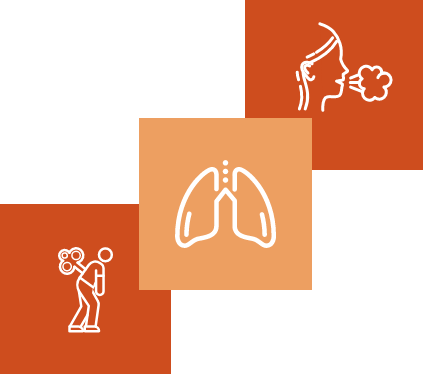
The IMPALA-2 trial
Breathing new life into autoimmune pulmonary alveolar proteinosis (aPAP) research
Why we are conducting the IMPALA-2 clinical trial
Autoimmune pulmonary alveolar proteinosis (aPAP) is a rare lung disease with no approved pharmacologic treatment options. This condition belongs to a family of distinct rare lung diseases collectively referred to as PAP. Autoimmune Pulmonary Alveolar Proteinosis represents about 90% of all patients with PAP.
PAP is characterized by the build-up of surfactant in the alveoli (air sacs) of the lungs. The surfactant consists of proteins and lipids and is an important physiological substance that lines the inside of the alveoli to prevent the lungs from collapsing. The lungs continuously produce new active surfactant. In a healthy lung, the surfactant is cleared by immune cells called alveolar macrophages. However, in lungs of patients with aPAP, the macrophages do not effectively clear the surfactant from the alveoli, leading to gradual accumulation of surfactant in the alveoli. The root cause of aPAP is an autoimmune response against granulocyte-macrophage colony-stimulating factor (GM-CSF), a naturally occurring protein in the body. Pulmonary macrophages need to be stimulated by GM-CSF to function properly, but in aPAP, GM-CSF is neutralized by antibodies against GM-CSF, rendering the macrophages unable to perform their tasks effectively, including the clearance of surfactant from the alveoli.
As a result of the accumulation of surfactant, oxygen transfer in the lungs is reduced and patients start to experience shortness of breath and decreased exercise tolerance as early symptoms. Typically, shortness of breath is first observed upon exertion, but as the disease progresses, shortness of breath can be experienced even when a person is at rest. Patients may experience cough, as well as episodes of fever, especially if secondary lung infection develops. In the long-term, the disease can lead to serious complications, including lung fibrosis and the need for lung transplant.

Details on the IMPALA-2 clinical trial
aPAP clinical trial design
The IMPALA-2 aPAP clinical trial is assessing the safety and efficacy of molgramostim nebulizer solution (molgramostim), an inhaled investigational drug, versus placebo for 48 weeks plus a 96-week open-label extension in adults with aPAP. (The open label period of the study is being extended from 48-weeks to 96-weeks, pending applicable regulatory and ethics committee approvals for the extension.) Both molgramostim and placebo are administered on top of the current standard of care, which includes supplemental oxygen when required and rescue treatment with whole lung lavage, if needed.
- Screening period: 6 weeks to determine eligibility
- Double-blind treatment period: 48 weeks; participants receive molgramostim or placebo (1:1 randomization)
- Open-label treatment period: 96 weeks; all participants receive molgramostim
- Safety follow up: 4 weeks
The science behind this investigational rare disease treatment
Molgramostim is a non-glycosylated form of a recombinant protein known as GM-CSF. GM-CSF is known to impact immune system response and has a key role in surfactant homeostasis and alveolar epithelial repair. Results from investigator-sponsored clinical trials and case studies indicate that GM-CSF may have a positive impact on oxygenation and clinical symptoms in aPAP patients.
Data from the first Phase 2/3 IMPALA clinical trial suggest that molgramostim may improve lung pathology, pathophysiology, and health status. Based on these findings, which were published in the New England Journal of Medicine in September 2020, the IMPALA-2 clinical trial is being conducted to further investigate the potential efficacy and safety of molgramostim in aPAP.
IMPALA-2 aPAP Clinical Trial FAQs
Where can I go for additional information?
All relevant study details and study contact information can be found on clinicaltrials.gov.
Who is the study sponsor?
The study is sponsored by Savara Inc.
